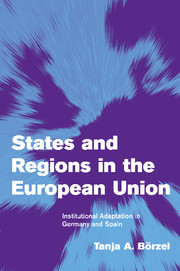Book contents
- Frontmatter
- Contents
- List of figures
- List of tables
- Acknowledgements
- List of abbreviations
- Introduction
- Part I Europeanization and domestic institutional change: A historical institutionalist approach
- Part II Reinforcing cooperative federalism: Institutional adaptation to Europeanization in Germany
- Part III Transforming competitive regionalism: Institutional adaptation to Europeanization in Spain
- Part IV Sharing versus shifting the costs of adaptation: The Europeanization of environmental policy-making in Germany and Spain
- Conclusions: Toward convergence in Europe?
- Appendix: The major EU environmental policies of the policy study
- List of references
- Index
Part II - Reinforcing cooperative federalism: Institutional adaptation to Europeanization in Germany
Published online by Cambridge University Press: 22 September 2009
- Frontmatter
- Contents
- List of figures
- List of tables
- Acknowledgements
- List of abbreviations
- Introduction
- Part I Europeanization and domestic institutional change: A historical institutionalist approach
- Part II Reinforcing cooperative federalism: Institutional adaptation to Europeanization in Germany
- Part III Transforming competitive regionalism: Institutional adaptation to Europeanization in Spain
- Part IV Sharing versus shifting the costs of adaptation: The Europeanization of environmental policy-making in Germany and Spain
- Conclusions: Toward convergence in Europe?
- Appendix: The major EU environmental policies of the policy study
- List of references
- Index
Summary
The first empirical part of this book analyzes the effect of Europeanization on German territorial institutions. Chapter 4 briefly maps the formal and informal institutions of the German federal system. I argue that the institutional culture of multilateral bargaining and consensus-seeking induces the Länder to pursue a cooperative strategy of “compensation-through-participation” in responding to centralization as the major challenge to their institutional autonomy. The Länder have always aimed to be compensated for their losses of regional self-determination through co-determination rights in federal decision-making. This sharing of adaptational costs has allowed for a redressing of the territorial balance of power through an incremental process of flexible adjustment avoiding structural reforms.
Chapter 5 starts by exploring the extent to which Europeanization has exerted pressure for adaptation on German territorial institutions. The transfer of domestic policy competencies to the European level has caused an uneven distribution of “say and pay” for the Länder which has seriously challenged the territorial balance of power in German federalism (1). Then, I show how the Länder have subsequently pushed for comprehensive co-decision powers in the formulation and representation of the German bargaining position in European policy-making in order to redress the territorial balance of power (2). I argue that this compensation-through-participation strategy of the Länder has succeeded in redressing the territorial balance of power (3) which facilitated a flexible adjustment of German territorial institutions to Europeanization.
- Type
- Chapter
- Information
- States and Regions in the European UnionInstitutional Adaptation in Germany and Spain, pp. 43 - 44Publisher: Cambridge University PressPrint publication year: 2001



